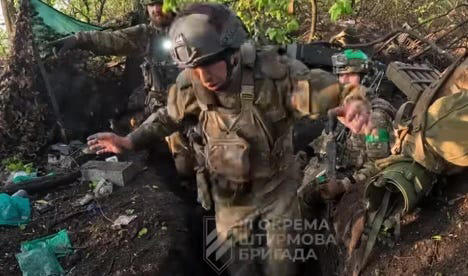Dozens of Russian soldiers have surrendered in Vovchansk, a northern town in Ukraine’s Kharkiv region, as heavy fighting continues.
A video released by Ukraine’s 3rd Assault Brigade appears to show Russian prisoners of war (POWs) emerging from trenches with hands raised, confirming reports of Russian soldiers surrendering en masse.
The footage, although not independently verified by Business Insider, illustrates the dire conditions faced by Russian troops.
Captured soldiers, interviewed in what looked like a school classroom, revealed they were often forced into the Russian army due to financial or legal troubles.
With minimal training and insufficient supplies, many Russian units suffered severe casualties. One POW recounted a disastrous night assault on a chemical factory, where only seven out of seventy soldiers survived a drone attack.
Complaints about poor leadership were common among the captured soldiers, who noted that their officers rarely participated in the frontline assaults. The video highlights the breakdown in Russian military strategy and support, contributing to their stalled offensive in Kharkiv.
Nazar Voloshyn, spokesperson for the Khortitsiya Regional Command, reported that nearly 60 Russian soldiers were captured in a single day of combat. He added that Vovchansk is now 70% under Ukrainian control, despite being just three miles from the Russian border.
This series of surrenders follows an earlier video from Ukraine’s 36th Marine Brigade showing the capture of wounded Russian soldiers during a counterattack.
The ongoing conflict in the Kharkiv region began in February when approximately 30,000 Russian troops launched an offensive across Ukraine’s northern border. However, the offensive has stalled, with U.S. national-security communications advisor John Kirby declaring it “all but over.”
Experts suggest that Russian President Vladimir Putin may have rushed the offensive to preempt incoming Western aid, fielding an understrength force in the process.
RAND geopolitical strategist Ann Marie Dailey believes Putin aimed to create a buffer zone to protect the Belgorod border region but lacked the means to capture Kharkiv city. Dailey predicts a broader Russian offensive effort later this summer


